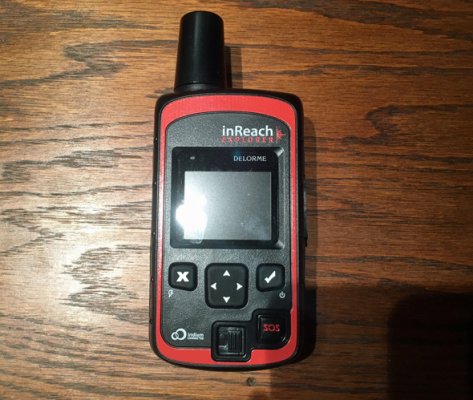Hi Scott. I had to dig out the owners manual and get online to answer your questions.

The device allows you to pre-program canned messages that you can send out quickly without a lot of button-pushing ("I've arrived" "I'm safe" etc.) but it makes no mention of any character limits for those "quick texts."
Once the Earthmate app has been downloaded to a phone or tablet, and the device has been paired with it, the InReach can accesses contacts lists and you can send text messages directly from the phone or tablet. Once again, the owners manual makes no mention of any character limits when using a phone or tablet, and I never experienced any limits. (Although I usually don't send long texts.) I also went to Garmin's website and didn't see any mention of character limits, and none of the reviews I read had complaints about character limits.
When you initially setup the device, you have to get online to create an account. When you select a service plan, it prompts you for a 15 digit IMEI number and a 5 digit authorization code. That's how it knows who the device belongs to. I don't know if the recipient's phone displays a phone number when they get a message. The person(s) you're texting have to have the free Earthmate app installed on their phone if they want to see where you were when you sent the text.
If you've paired the device to your phone, you will see the message on your phone. It is programmed to check for incoming messages every 20 minutes, so texting isn't as fast as it often is with cell phones, but you can reduce the frequency of how often it checks for messages in the device's Settings.
There is no charge to anyone who receives, or sends messages from/to you, but the text messages they send to you count against your service plan, and you get charged extra if you go over your allotted message limits. I think it's .20 cents extra for every text you send or receive over your plan's limit.
The device is basically water proof (IP 67) it has an internal GPS compass and barometer, and you can manually input known elevations and barometric pressures for increased accuracy. It's got a map display, and while it's pretty small, it would be better than nothing if you were lost and/or in distress.
I bought it primarily for emergency communications, and to let my family know I've arrived somewhere and I'm OK. I also wanted them to be able to reach me if they needed to. It works great for that. The UI is a bit clunky and takes a little getting used to, but you pick it up soon enough. It's much easier to do all the texting through your phone. I hope I answered all your questions.
Kev

